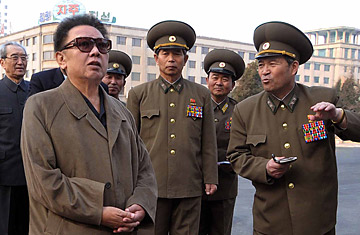
North Korean leader Kim Jong Il
When Kim Jong Il and the North Korean government get on a roll, they really get on a roll. On April 5, Pyongyang fired a missile disguised as a satellite directly over Japan and into the Pacific, in direct contravention of a 2006 U.N. resolution forbidding the North's ballistic missile program. Then, in a life-imitates-art moment, the U.N. Security Council issued what amounted to a strongly worded letter straight out of Team America: World Police condemning the missile test. The North, in response, called this "an unbearable insult," and said it would again fire up its reactor at Yongbyon, the source of fissile material for the North's suspected small arsenal of nuclear weapons.
Finally, yesterday, Pyongyang threw out monitors from the International Atomic Energy Agency and said the so-called six-party talks — the forum in which the U.S. and its key partners in East Asia (South Korea, China, Japan and Russia) have tried to talk Pyongyang out of its nuclear-weapons program for the past six years — were over. Not only would the North no longer participate, it would no longer abide by anything that it had previously agreed to during the talks, which includes the dismantling of the Yongbyon reactor. (See pictures of North Koreans at the polls.)
Publicly, the Obama Administration made the standard disapproving noises. "A serious step in the wrong direction," said White House spokesman Robert Gibbs. But in truth, North Korea's latest gambit could not have been altogether surprising to anyone in Washington — least of all to the State Department diplomats who have been dealing with the Democratic People's Republic of Korea (DPRK) for the past decade. They know that even in Pyongyang, North Korean officials have access to the Internet. If they cared to, they could have read yesterday's New York Times, which reported that the Obama Administration is considering dropping the U.S. demand that Iran cease enriching uranium before any direct Washington-Tehran talks about Iran's nuclear program. This would explicitly reverse the Bush Administration's position that talks could start only after the enriching stopped. "If you're the North Koreans and you read that, you're naturally going to ask, 'Why not deal directly with us too?' " says an East Asian diplomat seasoned in North Korea diplomacy.
And at Foggy Bottom, the response could be: Why not, indeed? The worst-kept diplomatic secret in the world may be that the State Department pretty much sees eye to eye with North Korea on a central issue: Washington should deal with Pyongyang one-on-one. The multilateral approach of the six-party talks has been at best cumbersome and at worst counterproductive, some diplomats say. Charles L. (Jack) Pritchard, Bush's former special envoy to the DPRK, has said all the participants in the talks "made it abundantly clear" that they support direct U.S. engagement, including the Chinese, the North's putative big brother and protector. He has said the only time significant progress was made was when U.S. officials negotiated directly with their North Korean counterparts — a point a senior South Korean diplomat involved in the talks confirms. (See pictures of the rise of Kim Jong Il.)
It's likely the White House shares this view, even though in public it has harped on getting the North Koreans back to the six-party format. This is probably no longer possible, after Pyongyang's announcement yesterday. So the trick for Obama now is twofold. He must figure out how much time to let pass before trying to re-engage the North. (Even before the April 5 launch, Obama's special envoy, Stephen Bosworth, talked of letting the "dust from the missile [test] settle.") Then Obama must decide what to say to Pyongyang whenever the moment of reaching out arrives.
Executing this seemingly simple agenda is more complicated than it appears. Obama, as Bosworth intimated, has to let a decent interval pass after the U.N. reprimand lest he appear to be caving in to pressure from Pyongyang. He can't dawdle, though. North Korea continues to be a serial proliferator of missile and nuclear technology. More sanctions, the diplomatic crowd argues, aren't obtainable, as the recent U.N. exercise showed, and in any event they don't work against a regime that seems to enjoy pain. The only way to get a grip on the danger the North poses is to instigate direct talks as soon as it is reasonable to do so.
Once talks begin, the U.S. ought to be willing to put a range of blandishments on the table — just as it has in the past. Economic aid, security guarantees and, down the road, even diplomatic recognition for North Korea — all that would be available to Pyongyang, so long as it verifiably stands down its nuclear program and curbs its missile exports. The State Department's position has long been that this sort of deal is achievable. It believes the North will abide by agreements it makes, so long as the U.S. does the same by providing the benefits it promises up front. There are many people, including some former members of the Bush Administration, who think this is delusional. But count on this: Obama is going to give those diplomats a chance to prove whether they're right.
